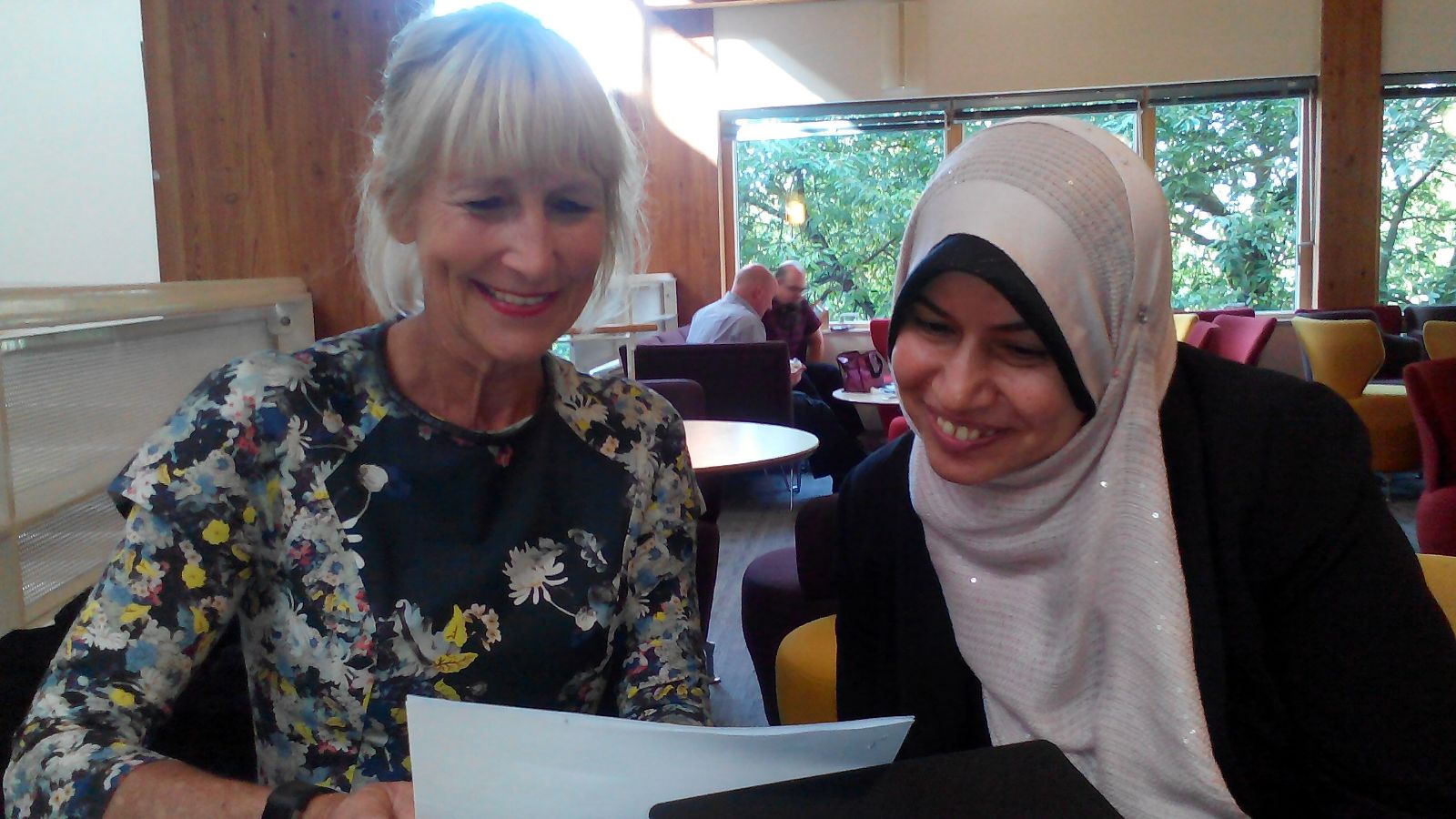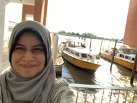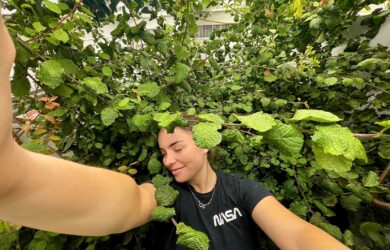
Mona Jebril speaks about her research on higher education in Palestine after the Arab Spring.
As an astronaut, Chris Hadfield mentions that he had to live with the attitude that once he is on earth, he might never get to space again - and if he did, he might never go back to Earth. Similarly, I had one of two choices; either to be in Gaza or out of it. I did not want to risk being locked inside Gaza since the borders are almost permanently closed and their occasional opening is unpredictable. For that reason, I see myself as an astronaut, a Gaza Cambridge astronaut."
Mona Jebril
Mona Jebril’s PhD thesis is the first study of the impact of the Arab Spring on higher education in Gaza. She hopes it will be a significant contribution to the Arab Spring dialogue, showing how young people were influenced by the revolution, how it manifested itself in Gaza, how it encouraged young people to have a voice and what the barriers are to getting that voice heard.
The aim of the thesis, titled "Academic Life Under Occupation: The Impact on Educationalists at Gaza's Universities", is not just to explore the sociological impact of war on higher education, but to explore what kind of interventions might work to democratise the education system, given the political pressures. “Higher education is usually top down from the government ministries or foreign intervention in Palestine. It is not about the voices of the people. My thesis gives voice to Palestinian lecturers and students and maps the past, present and possible future of higher education in Gaza,” says Mona [2012].
Mona had to change the focus of her PhD due to events in the Middle East. When she started she had wanted to do a study of Egyptian education and its influence on higher education at Gaza University. She worked on that for a year, but when Morsi was ousted as president of Egypt and the border between Egypt and Palestine was closed she had to change her plans and topic so it was focused solely on the impact of the ongoing political situation in Palestine/Israel and the Arab Spring on higher education in Gaza. Because she had lost a year, Gates Cambridge agreed to extend Mona’s scholarship for a year.
Due to the political situation, including the 2014 Israel-Gaza conflict which saw regular bombing of Gaza’s citizens, Mona has not been able to visit her family during her PhD for fear she would not be allowed back to the UK. She has not seen her family for five years. “Many things have changed in those years,” she says. Her father, an uncle and an aunt have died. A scholarship Mona and her brother founded for female students who study English at Al Azhar University of Gaza in 2008 has recently been renamed the Abdel Aziz Salim Jibril Scholarship, in honour of their father. Mona says: “My five siblings and I studied English for our undergraduate degrees. My father is an English Language and Literature graduate from the American University of Beirut and so he encouraged all of us to specialise in the same major for he believed it was a 'window looking over the world'.”
The importance of education
When she was born in Kuwait, Mona’s father worked in the ministry of higher education while her mother was a teacher. Throughout her childhood, Mona’s parents gave her and her siblings a strong sense of the importance of education and this was driven home in particular when the family were forced to move back to Gaza after her father and her mother lost their jobs following the end of the Gulf War. “My parents left everything they had, but what remained was their education,” she says. “My father was a great believer in the power of education both for individuals and for communities. It is about educating yourself and about changing the world around you.”
She adds: “The renaming is in honour of my father’s passion for education.” It is a passion clearly shared by his daughter.
There have been many other changes too in the time she has been away. Mona’s cousins have started families. Her nephews and nieces have grown up. Many buildings in Gaza have been bombed and people have died. The fact that so much has changed has made Mona anxious about returning because she has not been part of the changes. “Because I have not seen Gaza without these buildings and these people I know it will be really shocking,” she says.
Because she couldn’t return home, Mona was not able to do field work in the traditional way. Instead she had to conduct interviews over Skype.
She now feels she is at a crossroads. She has finished her research and has become more critical and more aware of the situation in higher education in Gaza. “I am neither fully in nor fully out of Gaza. I have also changed,” she says, adding that the process of doing her thesis has led to a lot of self-reflection.
“My academic work involves taking a distance from my subject, and that has been very challenging. I have tried to immerse myself in a new culture,” she says. She refers to Chris Hadfield’s book “An Astronaut’s Guide to Life on Earth” where he describes how he feels about returning to Earth. Mona says the image feels appropriate for her situation, particularly given she wanted to be an astronaut as a child. "Because of the continued siege on the Gaza Strip, in studying for my PhD at Cambridge, I found myself in a similar binary situation as that of Chris Hadfield," she says. "As an astronaut, Hadfield mentions that he had to live with the attitude that once he is on earth, he might never get to space again – and if he did, he might never go back to Earth. Similarly, I had one of two choices; either to be in Gaza or out of it. For that reason I have not visited home at all during the five years of my PhD study. I did not want to risk being locked inside Gaza since the borders are almost permanently closed and their occasional opening is unpredictable. For that reason, I see myself as an astronaut, a Gaza Cambridge astronaut."
Role model
Because of her situation, Mona put everything into her PhD and used it to explore issues that were personally important to her. “I have lived through bombardment. You feel that at any time a bomb could fall on you. When you do not die you feel you have been gifted with life and that you need to do something meaningful with it. This thesis meant a lot to me as it gave me a chance to convey how people felt, to give them a voice,” she says. “I do not regret being away. I feel I was doing important things which I hope will contribute to documenting the history of Palestinian education.” She studied the impact of factionalism on higher education, graduate unemployment, gender interaction at university and the impact of conflict on academics and students, both practically and psychologically. “I am interested in what is undermining reform in Gaza, how the environment restricts students, stops them exploring their potential, how unemployment makes them focus on their marks rather than on knowledge. I want to explore the idea of education as part of ‘de-development’,” she says.
Mona is now trying to publish her thesis’s findings in academic journals and more widely.
She says friends and family in Gaza are very proud of her achievements. One niece said she was a model for Palestinians because, although she had studied and worked in the Palestinian education system under very difficult conditions, she had been able achieve to the highest levels at both Oxford and Cambridge – Mona graduated from Oxford as first in class with a Distinction. She was called “an ambassador for Palestine”, a model for Arab women. Her nephews and nieces took chocolates to their school to celebrate Mona passing her viva without any corrections. Two had to write about a special person and both wrote about Mona. The expectations are clearly huge, but Mona feels her experience shows how Palestinian students could thrive with exposure to the world outside their country. “They would be supermotivated after years of isolation,” she says. “Education is a vital part of building a nation and building resilience.”
Picture credit: Mona with her PhD supervisor, Professor Diane Reay.

Mona Jebril
- Alumni
- Palestine
- 2012 PhD Education
- Queens' College












